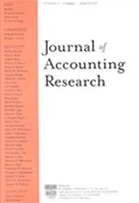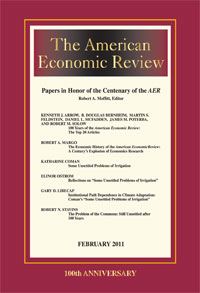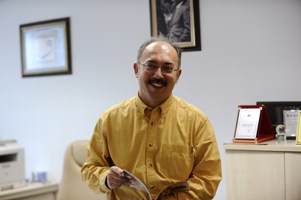Authors react in a variety of ways to criticism of their work. Some stonewall, some grit their teeth but make corrections, and others thank their critics. But what about bribery? Continue reading Did the author of a now-retracted article bribe a critic to silence him?
Category: economics
Want to appeal a journal’s rejection? Sure — that’ll be $700
 Different journals follow different editorial policies — but we’ve never seen any charge money to authors who want to appeal an editorial decision. Until now.
Different journals follow different editorial policies — but we’ve never seen any charge money to authors who want to appeal an editorial decision. Until now.
Recently, a criminal justice researcher sent us links to multiple journals that charge appeal fees. For instance, the Journal of Accounting Research says authors must pay $500 for each submission — and another $500 if they want the journal to reconsider its decision to reject the paper.
Under “Appeals,” the journal writes:
Continue reading Want to appeal a journal’s rejection? Sure — that’ll be $700
When most faculty publish in predatory journals, does the school become “complicit?”

Predatory journals – which charge high fees and often offer little-to-no vetting of research quality – are a problem, and lately an easy target for authors eager to spoof the problems of the publishing system. Although many researchers try to steer clear, not all do – a recent paper showed that some top economists publish papers in potentially predatory journals. Now, a new paper in the Journal of Scholarly Publishing reports the problem may be even more widespread. Derek Pyne found that most of his colleagues at the School of Business and Economics at Thompson Rivers University in British Columbia, Canada have at least one paper in a predatory journal. We talked to Pyne about how his colleagues and administrators reacted to his findings – and how he believes they should address them.
Retraction Watch: Why did you decide to look at how many of your colleagues in the business school have published in predatory journals?
“I placed too much faith in underpowered studies:” Nobel Prize winner admits mistakes

Although it’s the right thing to do, it’s never easy to admit error — particularly when you’re an extremely high-profile scientist whose work is being dissected publicly. So while it’s not a retraction, we thought this was worth noting: A Nobel Prize-winning researcher has admitted on a blog that he relied on weak studies in a chapter of his bestselling book.
The blog — by Ulrich Schimmack, Moritz Heene, and Kamini Kesavan — critiqued the citations included in a book by Daniel Kahneman, a psychologist whose research has illuminated our understanding of how humans form judgments and make decisions and earned him half of the 2002 Nobel Prize in Economics.
According to the Schimmack et al blog, Continue reading “I placed too much faith in underpowered studies:” Nobel Prize winner admits mistakes
Even top economists publish in predatory journals, study finds
Top-ranking economists sometimes publish papers in open access journals deemed potentially “predatory,” according to a new analysis.
The findings contradict previous results that show that researchers who publish papers in “potential, possible, or probable” predatory journals (as defined by librarian Jeffrey Beall) are largely inexperienced.
According to the study, 27 of the most eminent economists (within the top 5% of their field) have published nearly 5% of their papers in predatory journals. These researchers published 31 papers in predatory journals in 2015 alone.
The finding — which is not yet peer reviewed — comes as a “big surprise,” co-author Frederick Wallace of the Gulf University for Science and Technology in West Mishref, Kuwait, told Retraction Watch. Continue reading Even top economists publish in predatory journals, study finds
Journal pulls abstract author didn’t submit
 A journal has retracted an abstract after discovering the author didn’t submit it — and also because it appears “highly similar” to a previous publication in Chinese.
A journal has retracted an abstract after discovering the author didn’t submit it — and also because it appears “highly similar” to a previous publication in Chinese.
The abstract was presented at the 2nd International Conference on Biomedicine and Pharmaceutics in 2014, and lists Qing Guo as the sole author, based Wuhan, China at the China University of Geosciences.
According to the retraction notice, published in the Journal of Investigative Medicine last December, the organizer of the conference discovered Guo hadn’t consented to publish the abstract — moreover, it appeared to overlap with another article in Chinese, written by different authors: Continue reading Journal pulls abstract author didn’t submit
Economists go wild over overlooked citations in preprint on prenatal stress
 Citation omissions in an economics preprint have set off a wave of recrimination and speculation on a widely read economics discussion board.
Citation omissions in an economics preprint have set off a wave of recrimination and speculation on a widely read economics discussion board.
Commenters accuse the authors of purposely omitting citations that would have undermined the paper’s claims to novelty and contributions to the field, leveling acrimony and personal attacks. Economists Petra Persson at Stanford and Maya Rossin-Slater at the University of California, Santa Barbara told us they hadn’t been familiar with the omitted papers at the time they first posted their preprint, but their work remains distinct from these previous studies. Nevertheless, the two quickly updated the preprint of their paper – accepted by the top-tier economics journal American Economic Review – to include additional citations. An editor at the journal said it’s not unusual for authors to request such changes before publication, and dismissed the accusations made on the discussion board, calling the site “not a legitimate source of information.”
The study, “Family Ruptures, Stress, and the Mental Health of the Next Generation,” used data from Swedish national databases to compare mental health outcomes of people born to women who lost a relative while pregnant and women who lost a relative in the first year after giving birth. Continue reading Economists go wild over overlooked citations in preprint on prenatal stress
Dutch university ordered to pay economist after she was accused of plagiarism
 A court in the Netherlands has fined Vrije Universiteit Amsterdam (VU) 7,500 euros to compensate for “immaterial damage” to an economist accused of plagiarism.
A court in the Netherlands has fined Vrije Universiteit Amsterdam (VU) 7,500 euros to compensate for “immaterial damage” to an economist accused of plagiarism.
Karima Kourtit, a researcher at VU, has been at the receiving end of anonymous complaints to her institution accusing her of plagiarism and her professor, high-profile economist Peter Nijkamp, of duplication (i.e. self-plagiarism). Kourtit is now seeking to prosecute the unnamed source of the complaint for defamation; the VU told us it will no longer accept fully anonymous complaints.
The case began when VU cancelled Kourtit’s thesis defense for plagiarism, and a report published on the VSNU, the Association of Universities, accused Nijkamp of self-plagiarism. Two of Nijkamp’s papers have been retracted as a result of the investigation; Kourtit is an author on one of the retracted papers.
A VU spokesperson told us:
Continue reading Dutch university ordered to pay economist after she was accused of plagiarism
Ever been asked to review your own paper? This economist was

“Eerily familiar”: That’s how Serdar Sayan of TOBB University of Economics and Technology in Turkey says it felt to read a submission to the Scandinavian Journal of Economics, after the journal asked him to review the manuscript. It turns out, it was Sayan’s paper, word for word, equation for equation, down to the last punctuation mark. But this wasn’t a case of authors faking email addresses for reviewers to rubber stamp their own work – instead, the author had plagiarized from a paper Sayan had published a few years earlier. Sayan describes the surreal experience in the Review of Social Economy (vol. 74, no. 1, 2016), in a paper titled: “Serving as a referee for your own paper: A dream come true or…?”
“I have been asked by a journal to serve as a referee for my own paper. Obviously, this sounds just as unlikely, and probably almost as intriguing, as saying ‘I have attended my own funeral.’” — Serdar Sayan, Review of Social Economy (vol. 74, no. 1, 2016)
Retraction Watch: When you looked at the paper, how long did it take you to figure out what had happened? Continue reading Ever been asked to review your own paper? This economist was
Peer review scam leader now up to 20 retractions

We’ve unearthed four more retractions for Khalid Zaman, an economist who lost 16 papers in 2014 for orchestrating fake peer review.
That brings Zaman’s total to 20, and ties him at the #18 spot on our leaderboard.
One of the more recently discovered retractions is for fake peer review, attributed to Zaman; one is for plagiarism, and two other papers were withdrawn while in press, for reasons that are unclear. (Note bene: These retractions are all at least one year old.)
First, the retraction notice for peer review issues, published in April 2015 for “Environmental Indicators and Energy Outcomes: Evidence from World Bank’s Classification Countries:”
Continue reading Peer review scam leader now up to 20 retractions

